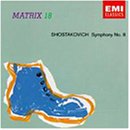| All Artists: Shostakovich, Previn, Lso Title: Dmitri Shostakovich: Symphony No. 8 In C Minor, Op. 65 (Matrix 18) Members Wishing: 0 Total Copies: 0 Label: Capitol Release Date: 7/11/1995 Genre: Classical Styles: Historical Periods, Modern, 20th, & 21st Century, Symphonies Number of Discs: 1 SwapaCD Credits: 1 UPC: 724356552128 |
Search - Shostakovich, Previn, Lso :: Dmitri Shostakovich: Symphony No. 8 In C Minor, Op. 65 (Matrix 18)
 | Shostakovich, Previn, Lso Dmitri Shostakovich: Symphony No. 8 In C Minor, Op. 65 (Matrix 18) Genre: Classical |
Larger Image |
CD Details |
CD ReviewsMUCH TO BE TRAGIC ABOUT DAVID BRYSON | Glossop Derbyshire England | 09/13/2003 (5 out of 5 stars) "Intense and gloomy tragedy is all part of my superficial western view of a distinctively Russian style. After hearing Tchaikovsky's Pathetique for the first time Shaw remarked that Tchaikovsky had a thoroughly Byronic capacity for being deeply tragic about little or nothing. No doubt Shostakovich imbibed this tradition too, but he had no need to be tragic for the sake of it - the world around him provided tragic material aplenty. Another difference, for me, is that whatever the external circumstances of his life and the external influences on his musical expression Tchaikovsky in the last resort wrote music for the sake of music. For Shostakovich that would have been a luxury. There was too much he wanted to say about the world he found himself in, and music was his way of saying it.The 8th symphony is as grim a product as even Shostakovich ever gave us. It rouses itself from the anguish of the first movement to bitterness and a touch of defiance in the next two, sinks back into a near-catatonic stillness in the fourth and attains some kind of resigned peace in the final section. The work dates from 1943. It was written apparently in the space of a few weeks, and I seem to find in it a consistency of style and mood that does not characterise everything by him. Small wonder, I suppose. There can't have been much about Russia in 1943 that provided much in the way of contrast or relief.What is likely to divide opinion over Previn's interpretation is his very slow speeds in the first and fourth movements. Music-lovers looking to acquire only one version would probably be well advised to hear some other versions as well, say Haitink and Karajan, before committing themselves. For my own part, I like it Previn's way. The near-annihilated state of mind that seems to me to underly the fourth movement comes over powerfully to me in this account. In the first movement the famous and extraordinary chain of gasping fortissimo chords is more powerful than ever for being given time to make its effect. The London Symphony seem to be back to their unique best after slipping a little in the 70's and 80's - they make a very special sound, hard to put into words but hard to mistake as well. The recorded sound is admirable.`Recommend' seems hardly the word for a record that does justice to a work like this, but if the piece is to your taste at all you will find no punches pulled here."
|
